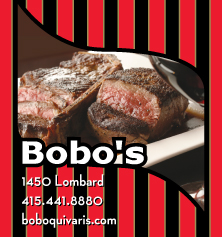SPORTS CORNER
Stefan Wever's promising MLB career lasted just 2-2/3 innings

Stefan Wever was just a guy I knew for several years by seeing him behind the bar at the Horseshoe Tavern on Chestnut Street. For the longest time I bought drinks from the man, knowing him only as a big guy who knows a lot about sports and is fun to talk to.
I find his tale fascinating, because he came so close to baseball stardom at the highest level, only to have it come crashing down with one pitch. And yet he’s completely OK with the entire experience.
When I sat down to talk to him about his brief career in the major leagues, Wever was candid and sincere. He graduated from Lowell High School in 1976. After dominating the San Francisco section in high school, Wever lettered at the University of California, Santa Barbara, where he garnered interest from numerous professional scouts. At 6 foot 8 inches and 240 pounds, Wever was an imposing fireballer with a great fastball, curveball and changeup. When he was on his game, he was virtually unhittable.
After finishing his career at UCSB, Wever was drafted into the New York Yankees organization. In 1982, after winning the Southern League (AA) Pitcher of the Year award, accomplishing the rare pitcher’s Triple Crown by leading the league in wins, ERAs, and strikeouts, he made the rare jump from minor Double-A to the majors.
Wever’s first and only major league appearance came against the Milwaukee Brewers on Sept. 17, 1982. He pitched for 2-2/3 innings, but tore his rotator cuff in the process, ending his career. He is one of only a few pitchers to face two future Hall of Famers as his first two batters.
Here are some excerpts from my interview with Wever.
On his injury: “What if Pavarotti ruined his voice on his first night singing as a tenor? That’s how I felt when I hurt my rotator cuff. It might be an egotistical way of looking at it, but that’s how I feel. I keep myself going by knowing in my heart that I was one of the very best there was when I was 100 percent. I could have had a great career, but it didn’t happen. I can’t dwell on it, although when it first happened, I must admit that I was shocked and bitter.”
On his call up to the Yankees: “We had just won the Double-A championship for Nashville and I won 18 games that season for them. I figured the season was over and I was headed back to San Francisco. But my manager at the time (the late Johnny Oates) called me into his office. My pitching coach was Hoyt Wilhelm, the great knuckleball pitcher, and he was there too. When I saw them sitting there, I figured I was going up to the Yankees’ Triple-A club in Columbus. But they told me, ‘You’re going to New York.’”
On his one and only MLB start: “It was my sixth day in the majors and we were in Milwaukee playing the Brewers. They called them ‘Harvey’s Wallbangers’ back then, because Harvey Kuenn was their manager and they had a great lineup. They were on their way to the World Series that season. It had rained during the day and the mound at County Stadium was muddy. The first two guys I faced that day are now in the Hall of Fame – Paul Molitor and Robin Yount. I don’t know if that’s a record or not. Well, Molitor hit a six-hopper through the right side for a single, and Yount hit a double, scoring Molitor. The next batter was Cecil Cooper and I threw him a really good changeup, but he hit it to center field where Jerry Mumphrey misplayed it. That should have been the first out. Ted Simmons was up next and he hit a ground ball through our shortstop’s [Andre Robertson] legs. That should have been the second out. The next batter was Gorman Thomas and he hit it a mile – a three-run homer. That’s when I felt a twinge in my shoulder. But hell if I was coming out. I kept pitching and they kept hitting, and by the time they took me out I had pitched 2-2/3 innings, gave up six hits, nine runs (eight earned), walked three, struck out two, gave up one homerun, and threw three wild pitches. We lost, 14–0. It just wasn’t a good game for us. But I had no idea it was my last game.”
On the aftermath of his injury: “I didn’t pitch again in 1982 and I began to feel pain the first time I picked up a ball over the winter. The Yankees told me to take it easy, which I did. When I went to spring training in ’83, Billy Martin was the new Yanks’ manager. He told me that I was going to be his No. 5 starter. Billy liked big, hard-throwing guys and that’s what I was. Or had at least been at one time. What we didn’t know until a little later was that my arm was done. I used to throw 95 and now I was maxing out at 85. I went to see an expert and in two minutes he knew that my rotator cuff was fully torn. I tried to make a comeback at Triple-A, but I was simply delaying the inevitable. My baseball career was over.”
On his recurring dream: “I still have this dream all the time, and sometimes it’s really vivid. I’m on a field, but it’s more like a cow pasture. Don Mattingly’s there. Buck Showalter’s also there. All my teammates are there. And I’m there, trying to get back into the major leagues. But, I never quite make it to the field.”
E-mail: [email protected]


